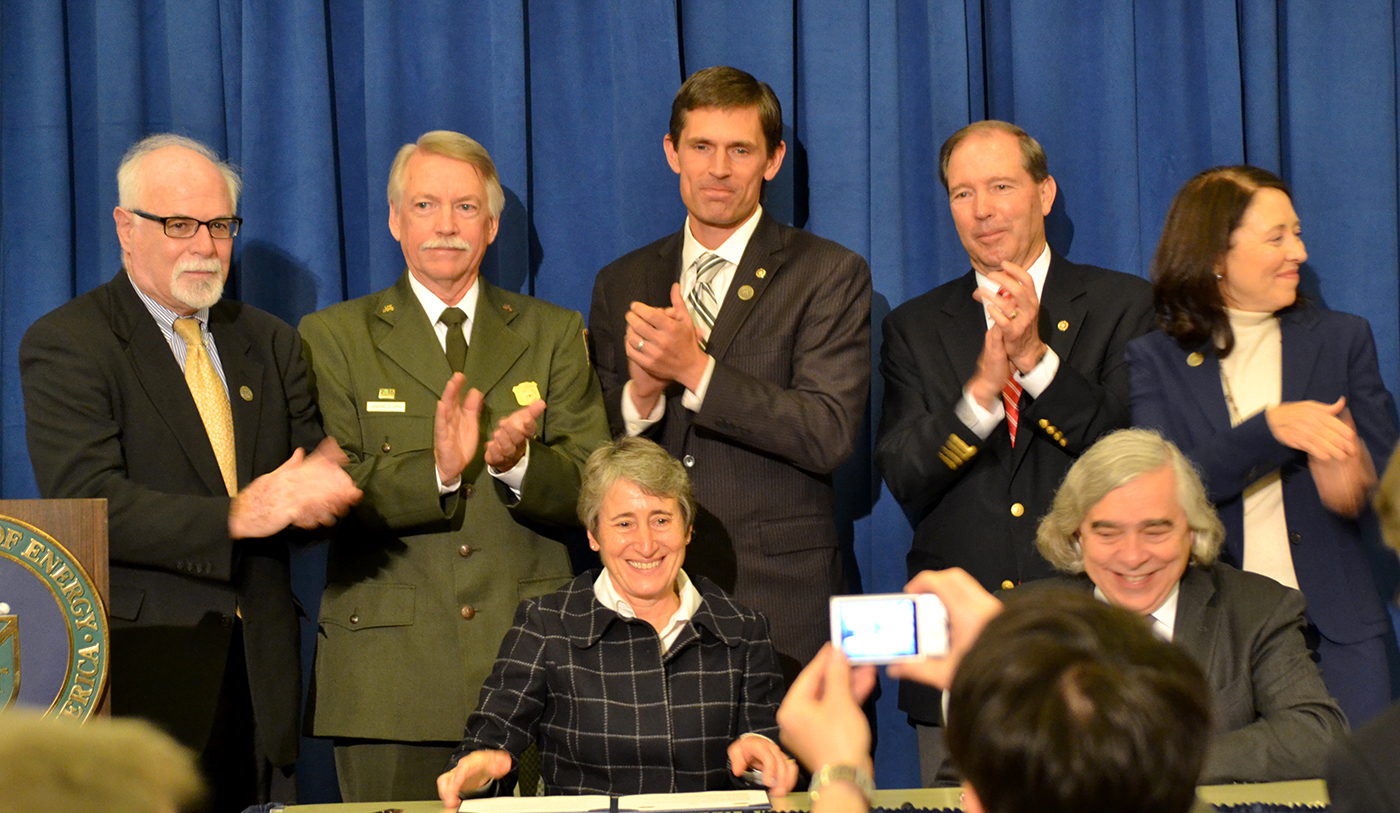Today, the Atomic Heritage Foundation (AHF) welcomes the official establishment of the Manhattan Project National Historical Park with units at Los Alamos, NM, Hanford, WA, and Oak Ridge, TN. In a ceremony at the Interior Department this morning, U.S. Secretary of Energy Ernie Moniz and Secretary of the Interior Sally Jewell signed an agreement that defines the respective roles of the Department of Energy and the National Park Service in implementing the new park.
“Today is a milestone for Manhattan Project history,” states the Foundation’s President, Cynthia C. Kelly, who attended the ceremony along with the Foundation’s staff. “For more than a decade, the Atomic Heritage Foundation and our partners have been working to preserve Manhattan Project sites and create the park. The national park is long overdue and will provide Americans with an important opportunity to understand the Manhattan Project and its complex legacy for the world today.”
The sites of the Manhattan Project Park “are among the world’s most significant places, where work was done that changed the human world forever,” affirms Richard Rhodes, Pulitzer Prize-winning author of The Making of the Atomic Bomb and a member of the Foundation’s Board of Directors.
In her remarks, Secretary Jewell discussed how the park “can more widely tell the human story” of the 600,000 people who worked on the Manhattan Project. Emotionally recalling a visit her mother-in-law, an Army nurse, took to Hiroshima and Nagasaki after the atomic bombs were dropped, she emphasized, “We are a country that strives to tell the complete story.”
Secretary Moniz hailed the achievements of the national scientific laboratories that emerged from the work of the Manhattan Project. The new park, he declared, “will provide the platform for our citizenry to understand the roots of this and what it means for our future responsibilities.”
Senators Maria Cantwell of Washington, Lamar Alexander of Tennessee, and Tom Udall and Martin Heinrich of New Mexico also spoke about the significance of the Manhattan Project and applauded the communities of Los Alamos, Hanford, and Oak Ridge for their work to make the park a reality. Senator Heinrich praised the work of the Foundation and its partners: “I want to especially thank the Atomic Heritage Foundation, which has worked in collaboration with the Los Alamos Historical Society and with the Bradbury Science Museum to preserve and interpret historic Manhattan Project properties in Los Alamos.”
The Manhattan Project National Historical Park Act, which became law on December 21, 2014, required that the two Departments reach an agreement within a year of enactment to formally establish the park as part of the National Park System. With the signing of the Memorandum of Agreement today, the Manhattan Project Park becomes one of over 50 national historical parks, including the Abraham Lincoln Birthplace in Kentucky, Harpers Ferry in West Virginia, and the Klondike Gold Rush National Historical Park with units in Alaska and Washington.
The park will have three units: Los Alamos, NM, Oak Ridge, TN, and Hanford, WA. The National Park Service estimates it will take two more years to complete the planning for the park, and three to five years after that to prepare the sites for public access, but local museums are eagerly awaiting an influx of tourists at each of the three sites. Virtual tours of Hanford and the B Reactor are already available through the Foundation’s innovative “Ranger in Your Pocket” website, where visitors can choose from a broad selection of programs.
The Foundation has developed an array of educational resources to help interpret the new park. These include a growing Manhattan Project Veterans Database with 10,000 profiles, and a collection of more than 340 oral history interviews on the “Voices of the Manhattan Project” website. For example, visitors can listen to General Leslie R. Groves recall selecting Los Alamos for the project’s scientific laboratory: “It didn’t take me long to say, ‘This is it.’”
From the dozens of refugee scientists who joined the project at Los Alamos to the “Calutron girls” of Oak Ridge, the people who worked on the Manhattan Project represented the diversity of the American experience. As one of the few national parks to focus on American science, technology, and industry, the Manhattan Project Park is an excellent opportunity to engage the public in learning about innovation in science, engineering and technology. The park will also enable visitors to reflect on the decision to drop the atomic bombs on Japan and the Manhattan Project’s legacies for today. The Atomic Heritage Foundation looks forward to working with the National Park Service, partner organizations, and the local communities to continue to preserve and interpret this important history.





